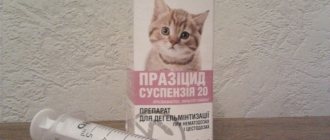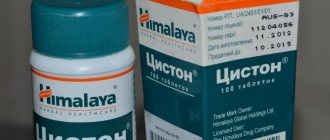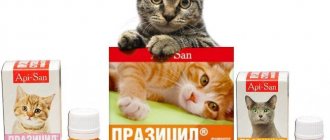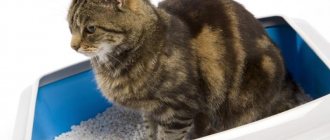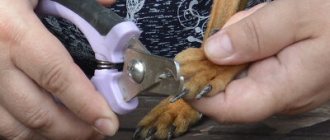Is it necessary to worm a cat before vaccination?
Whether it is necessary to worm a cat before vaccination is a very controversial question, since if the pet is clean, there is no need to do this.
Anthelmintic drugs should be given before vaccination.
Anti-parasite medications are most often given to animals for preventive purposes. However, if vaccination is planned, and your pet is found to have worms, it is necessary to deworm it in advance.
The doctor will refuse to vaccinate the owner if the parasites are not removed from the cat’s body. What exactly is the reason? The fact is that parasites weaken the animal’s body. Accordingly, the vaccine introduced during this period will not help, but, on the contrary, will worsen the pet’s condition. It is for this reason that it is necessary to worm the cat in advance.
Contraindications and side effects
Anthelmintic drugs for cats have a number of contraindications and side effects:
- the kitten is less than 2 months old;
- a nursing or pregnant cat (at least 3 weeks must pass after the birth of kittens);
- the pet is underweight;
- problems with the digestive system;
- presence of infectious diseases;
- allergy to the drug.
If you follow the conditions for taking anthelmintic drugs for cats, there will most likely be no side effects. But in some cases, diarrhea, vomiting, loss of appetite and lethargy may occur.
When to worm a cat before vaccination
How to give a cat deworming tablet and how often to give it
How many days before vaccination should I give my cat anthelmintic? According to the established rules, you will need to give the anti-parasite pill twice. The first time this is done 2-3 weeks before the injection is given. The second procedure will need to be carried out after vaccination in 10-14 days.
For your information! The bottom line is that it is necessary to destroy not only adult helminths, but also the subsequently hatching larvae.
Parasite eggs can remain in the pet’s body for some time.
Why is it important
When vaccinated, weakened pathogens of various infections are introduced into the cat’s body. They cannot cause disease, but contain antigens. In response, the immune system produces antibodies - special active substances that help destroy “uninvited guests”.
Helminths take away some of the nutrients, causing the cat to experience a deficiency of vitamins and minerals. In the process of parasitism, the functioning of internal organs is also disrupted, the immune system is weakened, and its protective functions are reduced, which facilitates the penetration of pathogenic microorganisms into the animal’s body. As a result, the immune system cannot provide a full response to vaccine antigens. In addition, if there are two enemies in the body - worms and viruses - the immune system has to fight on 2 fronts, which turns out to be quite difficult for it. As a result, vaccination may be useless: immunity to the vaccine will not develop, and the cat will get sick the first time it encounters the virus. This situation is called “breakthrough of post-vaccination immunity.”
It is especially important to eliminate parasites before rabies vaccination. This vaccination requires an adequate immune response to provide full protection. If the immune system is not strong enough, the cat may become infected with a fatal infection.
How to prepare a cat for vaccination
Having found out how many days after deworming a cat can be vaccinated, you should also understand how the animal prepares for vaccination. It also matters what type of vaccination will be given.
How many days does a cat walk: examples for the first time and how long in time
Veterinarians most often ask owners to adhere to the following rules before vaccinating:
- if vaccination is carried out only once, taking medications against worms should end no later than a week before the injection;
- when it is planned to vaccinate against several types of diseases at once, the cat’s body should be cleansed at least 2-3 weeks in advance, depending on the type of tablets that are given to the pet;
- You can vaccinate against rabies only a month after the cat has been dewormed;
- if it is necessary to re-vaccinate against several types of diseases, cleansing is carried out 21 days before the injection.
Important! How you can understand how long before vaccination you need to worm a cat depends on the specific case. Therefore, when you bring your pet for an examination, you should discuss this issue with your veterinarian in advance.
Preparing the cat for the procedure
When is deworming contraindicated?
Just like any other medications, anthelmintics have certain contraindications.
Antihelmintics should not be given to animals:
- less than 21 days old;
- expecting kittens (in the first and second third of pregnancy);
- nursing kittens (in the first three weeks after their birth);
- weighing less than 500 grams;
- weakened due to exhaustion, liver and kidney function disorders, the presence of diseases that can lead to a decrease in immunity;
- suffering from vomiting and constipation.
Attention! A prerequisite for deworming is strict adherence to the requirements specified in the instructions for the anthelmintic drug. Taking antihelminthic drugs without consulting a veterinarian is not advisable.
Be sure to read:
Worms in kittens: signs, symptoms and treatment
How to properly deworm cats and kittens
First of all, the deworming procedure should begin with the destruction of external parasites, that is, fleas. They are carriers and can add additional problems to the animal.
When kittens open their eyes: how many days after birth
Both adults and kittens can be dewormed only if they are healthy. A sick animal cannot be cleared of parasites until it has fully recovered.
Note! It is very important to follow the dosage, especially when the issue concerns children. It is best to ask your doctor about the type of drug that will suit your particular animal. Not every substance is suitable for both adults and kittens.
Most medications are given to the pet in the morning and on an empty stomach, that is, before the pet has breakfast.
Timing of deworming
Deworming is carried out 1–3 weeks before vaccination, depending on the type of anthelmintic. If the kitten’s parents did not undergo routine deworming before mating, or if live helminths are noticed in the feces, the drug must be given again after 10 days. You should not vaccinate your cat immediately after deworming. It is necessary to wait time for the pet’s body to fully restore its immune reserves.
It is also recommended, after eliminating the parasites, to feed the pet with prebiotics and probiotics that restore the intestinal microflora. If there are a large number of parasites, you may even need a laxative, such as Vaseline oil. If your cat is dewormed correctly and in a timely manner, she will easily tolerate vaccination.
Is it necessary to worm again after 10-14 days?
If the cat has already been vaccinated after deworming, and no further vaccination is planned, the question arises: is it necessary to re-give the medicine to the cat? As already mentioned, after 10-14 days the cats are given anthelmintic again to destroy any larvae that may have remained in the body.
However, this issue should be approached with caution. First of all, you should carefully observe your pet. If after the injection he feels well: eats, drinks, plays, additional cleansing will not harm him. If your pet is experiencing any health problems, such as vomiting, diarrhea, or other symptoms, you should consult with a veterinarian before reintroducing medications.
Anthelmintics for cats before vaccination
Medicines intended to deworm cats are available in the form of tablets, suspensions, solutions for giving injections or drops on the withers, and there are also sugar cubes.
Important! Under no circumstances should medications intended for human use be given, even in small quantities. The cat’s body may simply not accept such substances, which will lead to great harm to the pet.
List of the most popular tablets prescribed to cats:
- azinox. The active substance is praziquantel;
- febtal. Active ingredient fenbendazole;
- Alben C;
- Caniverm;
- dronzite.
If your cat has a negative reaction to taking the tablets, a suspension may be used as an alternative. The most popular medications:
- prazicide;
- prazitel;
- Ddirofen.
For your information! The active ingredients in all medications are praziquantel and pyrantel pamoate. The only difference is the dosages used.
The use of drops on the withers is allowed only if taking the medicine orally is simply impossible. The most suitable substances for this are Profender and Stronghold. Both of these drugs have a complex effect and are designed to kill both fleas and worms. The substance is often applied to the area of the shoulder blades so that the cat cannot lick it off.
Another alternative is sugar cubes. Polyvercan is intended for oral administration, and cats readily lick them off. It is also possible to give an injection, but this will require certain skills from the owner.
Popular remedies for parasites
Important! Small kittens should not be given the same medications as an adult pet.
In this case, a special anthelmintic type of medicine with a lower content of active substances is used.
Use of general flea, worm, and tick vaccines
If, in addition to fleas, your pet is found to have ticks and worms, it is better to use a comprehensive parasite injection. One injection will help rid the animal of all pests at once. List of common vaccines:
- Barmek;
- Ivomek;
- Novomek;
- Tsevomek;
- Ivremek;
- Otodectin.
Otodectin
A veterinarian will be able to select the correct vaccine and dosage for vaccinating a cat. He will take into account the general condition of the animal and the degree of parasitic infestation. As with the previously discussed drugs, the full course is 2 injections. The first one eliminates the main wave of parasites. A second injection against fleas, helminths and worms prevents the resumption of their population.
How to inject a cat at home? Persons with veterinary education are allowed to vaccinate. The slightest excess of the amount of the drug and incorrect calculation of the dosage will lead to increased side effects. The injection is given in the thigh or withers. Typically, the amount of the drug is 0.1 ml per 5 kg of animal weight. But the dosage may be different from different manufacturers.
Flea injections in cats cause the following undesirable symptoms:
- increased overexcitation;
- intense salivation;
- frequent urination;
- lack of appetite;
- vomit.
The listed effects do not indicate an atypical reaction to the drug. All cats experience symptoms to varying degrees. There is cause for alarm if it does not go away within a few days.
Precautionary measures Veterinarians give flea injections to cats. It is better to carry out the procedure in a sterile clinic room. Tools must be disinfected. The specialist must wear clean rubber gloves when working. This will prevent infection from entering the cat's bloodstream.
The drug should not be administered to sick animals. A weakened immune system copes worse with the effects of neurotoxins. The consequences of vaccination in this case can be sad.
The active substances that form the basis of the injections have an aggressive effect on the mucous membrane. In case of accidental contact with eyes, immediately rinse the affected area with running water.
Deworming with folk remedies
The use of traditional methods of deworming is most often justified by causing less harm to the pet’s body. This is especially true during pregnancy or breastfeeding. There are quite a lot of folk recipes against worms:
- decoction of chamomile and fennel. Dry grass is poured with boiling water and infused for 20-30 minutes. The decoction is added to the drinking bowl or poured into the animal’s mouth once a day for a week;
- onion decoction. Fresh onions are poured with boiling water and left for 20-30 minutes, and then filtered. The cat is given the decoction in the morning on an empty stomach for a week;
- alcohol tincture of wormwood is sold in pharmacies. Give 5-10 drops in the evening before meals. Course - 1 week;
- freshly squeezed carrot juice 10-20 ml every day for a week;
- fresh garlic. 1 slice is added to the food. Course - 1 week.
Note! Such treatment options are only partly safe. Decoctions and juices cannot cause intoxication, but can cause an allergic reaction or stomach upset.
Garlic for worms - an old-fashioned method
Frequency of antihelminthic treatment of pets
An animal should be treated for worms according to a clear schedule, which is usually agreed upon with a veterinarian. To set deadlines, the following criteria must be taken into account:
- pet's age;
- presence of chronic diseases;
- the presence or absence of pregnancy and lactation.
The first dose of anti-helminth medication should be given to kittens already on the 22-23rd day of life. Treatment and prevention are also necessary for a nursing cat; a safe anthelmintic is selected for it or traditional methods are used.
Kittens and cats that have given birth are at risk, since infection can quickly lead to intoxication
After primary therapeutic deworming, medication is repeated once every three months if the pet is constantly in contact with other animals and goes outside. It is enough to treat domestic cats in the spring and autumn, when the risk of contracting parasites is highest.
Transitional seasons are a fertile time for infection with worms
If the animal is undergoing surgery, deworming is carried out unscheduled. Parasites negatively affect blood clotting, which can cause massive bleeding during the procedure.
Attention! Since infection with helminths also occurs in utero, the cat should be well dewormed before mating if more than three months have passed since taking the medication. This is done two weeks before mating.
How to evaluate the effectiveness of an anthelmintic procedure
You can evaluate the effectiveness of the procedure and understand that the pet actually ate the drug and did not spit it out after 1-3 days (depending on the type of medication). As a rule, if the cleansing is successful, then fragments of dead parasites can be seen in the animal’s feces. However, if this does not happen, you should not re-administer the drug to avoid an overdose.
In most cases, deworming for a cat goes unnoticed. Rare exceptions such as loss of appetite or changes in stool are attributed to a side effect of the medication.
Important! Sorbents reduce the effectiveness of anthelmintic drugs, so it is not recommended to give them during the cleansing period.
Symptoms of worms in a cat
It is almost impossible to determine independently, “by eye,” whether an animal is infected or not, since the symptoms of parasite species are very different.
There are some common signs.
- change in the nature of appetite - decrease or increase;
- variable stool - diarrhea alternates with constipation;
- vomiting or retching, mucus or a small amount of blood may be detected;
- the presence of mucus, blood or helminth larvae in the feces;
- irritation and itching in the anal area (this manifests itself in “riding” on the butt);
- bloating that occurs periodically;
- lethargy and weakness;
- dullness of coat;
- allergic reactions (hair loss, falling on the ears, discharge from the eyes and nose, sneezing);
- if the cat is pregnant, a parasitic infection can cause premature birth and miscarriage;
- when one kitten from a litter is affected, there is a noticeable difference in development compared to the rest;
- weight loss (regardless of nutrition);
- with a strong spread of helminths in the body, paralysis of the limbs occurs.
If two or more signs of disease are detected, a veterinarian should be consulted. He will be able to identify the type of helminths and prescribe medications for treatment. But prevention is most important, especially before vaccination.

